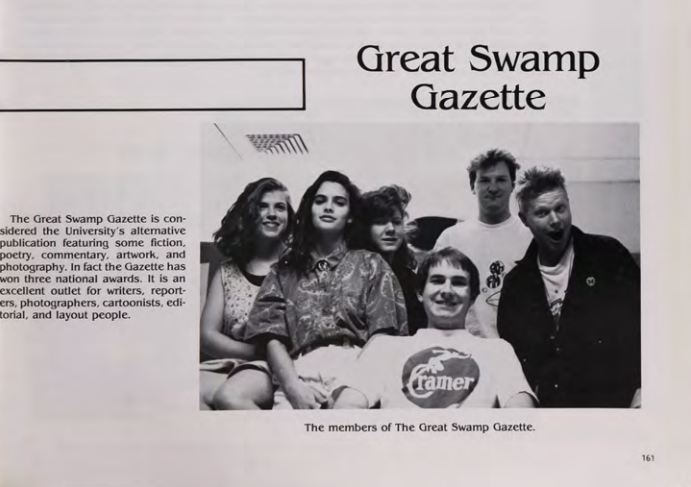While it’s now common knowledge that the University of Rhode Island’s primary outlet for news for over the past half-century has been The Good Five Cent Cigar, there was a time when that wasn’t exclusively the case.
The Great Swamp Gazette was introduced as the University’s alternative magazine and was first published in November 1977, released on a bi-weekly basis. The paper was created by students to address more social and political issues and attempt to get readers to engage more with those issues; sporting the tagline “Some clear thinking out of the muck and mire.” Along with that, the magazine sported a myriad of different journalistic and artistic pieces, including photography, cartoons, poetry and short stories.
“It was a fairly tight-necked group of individuals that were diverse politically, economically, religiously,” Former Managing Editor Scott Traudt, ‘90 said. “The common goal was to get something out there and make people think.”
Traudt was editor from 1988 to ‘89, who majored in marine affairs and political science. Traudt used the magazine as an output to express his opinions and give his perspective on current events.
“I never shot down an idea for being a bad idea, I pretty much ran with everything,” he said. “Back then whether you’re a leftist, a right-winger guy, Republican, Democrat, socialist, communist… it didn’t make any difference how bipolar you were politically, they all hung out with each other. We were all friends.”
Brian Jepson, ‘05, was both an assistant and the entertainment editor for the Gazette around the same time.
“The door was always kinda open, and we were down the hall from the Cigar, and it could really vary,” Jepson said. “People could just wander in and then submit stuff.”
What was more clear to him, though, was the process of making the physical magazine itself. This relied more on traditional printmaking methods combined with the usage of a phototypesetter, an analog typing device which predated personal computers. Jepson was also present at the time they switched over to using Macintoshes, something which he and fellow writers weren’t too keen on.
“At first we didn’t really fully embrace the ability of the computer to lay out the page, so we would still print things out in columns and paste them up with wax and stuff,” Jepson said. “Just for a little while before we got our act together.”
Although not as big as the Cigar, the Gazette had its own fair share of interesting stories to tell. Traudt recalled that before he became editor there was a wiretapping scandal involving the Gazette releasing info exposing an administrator for attempting to coerce a student. Jepson briefly mentioned that he was present at an anti-war protest at the Pentagon, most likely regarding the Salvadoran Civil War, which he documented. There was also a large set of stories released in the fall of 1988 which featured Traudt traveling to Afghanistan during the Soviet-Afghan War and documenting his journey with a group of mujahideen rebels, an event which partly influenced the trajectory of his career.
“My stories were basically a travel log of what I did, where I went, and what I saw when I was there,” Traudt said. “It set me kinda on a course of lifestyle where I travel a lot overseas.”
Traudt ended up returning to Afghanistan in 2006. Later, he traveled to Libya in 2011 during their civil war and recently went to Ukraine during the early months of the Russian invasion in 2022. On the other hand, Jepson ended up becoming the publishing director for the U.K. based software organization Raspberry Pi.
“Just having deadlines, budgets, processes, all that sort of stuff- It was good, it gave me a love of publishing,” Jepson said. “Being business manager of the Cigar, and assistant editor of the Gazette it kinda gets into your blood.”
Despite these successes though later issues began to phase out the political aspects, shifting its focus exclusively towards literature and art. By the late 1990’s interest began to wane and release schedules became more inconsistent, leading the publication towards its unceremonious end sometime around early 2001. While the idea of introducing a print magazine these days would be questionable, both Traudt and Jepson believe a revival of the Gazette could work.
“There’s so much you can do with it, it’s really limitless,” Jepson said. “It’s always going to reflect what the culture of the campus is.”
Traudt added onto this, addressing the power a publication like the Gazette could hold now.
“You could have a lot of ideas from different angles, a lot of different art, a lot of different things that can get in there and make people think,” Traudt said. “Get an idea. Get it out there. Cause when the idea stops hope stops.”
Only time will tell whether a similar publication would come out of the woodwork and be taken up in the arms of URI’s students. For now though, The Great Swamp Gazette’s legacy remains tucked inside the walls of the University’s library, resting on a shelf in the archives.





